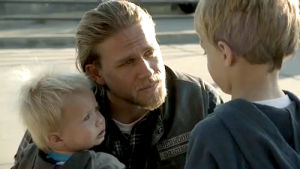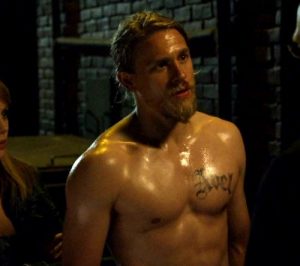This is my husband’s acid comment when he catches me watching an episode of Sons of Anarchy for the second time. It annoys Joe when I view TV shows more than once. He and a coauthor write books on film and eco-criticism, and they study certain movies over and over to analyze them. Maybe he wonders why I would subject myself to the monotony for no productive reason. Or maybe the obsessiveness of my behavior disturbs him. (He’s threatened to divorce me if I re-watch another series that shall remain unnamed.)
 The blond psychopath he’s referring to is Jax Teller, hero of Sons of Anarchy, played by Charles Hunnam. And yeah, I like looking at Jax. A more macho version of Brad Pitt, Hunnam frequently displays his lean, muscular, elaborately tattooed body in the shower and in bed. He talks in a flat, kind of dumb California accent and — in the early seasons before experience hardens him — walks with the swagger of a juvenile delinquent. Somewhere inside me, a sixteen-year-old self is altogether smitten. “He’s so tortured,” the sixteen-year-old sighs. “He’s good at heart, I just know.”
The blond psychopath he’s referring to is Jax Teller, hero of Sons of Anarchy, played by Charles Hunnam. And yeah, I like looking at Jax. A more macho version of Brad Pitt, Hunnam frequently displays his lean, muscular, elaborately tattooed body in the shower and in bed. He talks in a flat, kind of dumb California accent and — in the early seasons before experience hardens him — walks with the swagger of a juvenile delinquent. Somewhere inside me, a sixteen-year-old self is altogether smitten. “He’s so tortured,” the sixteen-year-old sighs. “He’s good at heart, I just know.”
 For those who missed the series, it follows the exploits of the Sons of Anarchy, a biker gang who make their living as gunrunners. They buy weapons from the IRA and sell them to other gangs, who seem to go through them the way a whore goes through condoms. The Sons style themselves as a motorcycle club and have a clubhouse at the Teller-Morrow automotive repair shop in the bucolic town of Charming, California. They even have their own acronym, SAMCRO (Sons of Anarchy Motorcycle Club Redwood Original), pronounced Sam Crow. The townsfolk call them Sam Crow as if they were one individual, which is about right. Like any gang, they’re a tight-knit group with one set of rules among themselves and another set for the outside world.
For those who missed the series, it follows the exploits of the Sons of Anarchy, a biker gang who make their living as gunrunners. They buy weapons from the IRA and sell them to other gangs, who seem to go through them the way a whore goes through condoms. The Sons style themselves as a motorcycle club and have a clubhouse at the Teller-Morrow automotive repair shop in the bucolic town of Charming, California. They even have their own acronym, SAMCRO (Sons of Anarchy Motorcycle Club Redwood Original), pronounced Sam Crow. The townsfolk call them Sam Crow as if they were one individual, which is about right. Like any gang, they’re a tight-knit group with one set of rules among themselves and another set for the outside world.
However likable they seem at times, the Sons are psychopathic ruffians. Hardly an episode goes by without them gunning down two or three dozen people. If they walked into the bar where I was sipping my non-alcoholic beer, I’d head for the nearest exit. Slowly. I wouldn’t want them to notice me. Yet I can’t get enough of them on screen.
 Clay Morrow (Ron Perlman), the grizzled club president, is one of nine founding members of the Sons. Another is John Teller, who died years ago in shadowy circumstances. It’s gradually revealed that Clay and John’s wife Gemma (Katey Sagal) — now married to Clay — caused John’s death. As John and Gemma’s son, Jax is heir apparent to the club’s leadership. He eventually takes over from his unwilling stepfather.
Clay Morrow (Ron Perlman), the grizzled club president, is one of nine founding members of the Sons. Another is John Teller, who died years ago in shadowy circumstances. It’s gradually revealed that Clay and John’s wife Gemma (Katey Sagal) — now married to Clay — caused John’s death. As John and Gemma’s son, Jax is heir apparent to the club’s leadership. He eventually takes over from his unwilling stepfather.
The other Sons, in fact all the show’s characters, are given enough complexity to make them real. Bobby (Mark Boone Junior) earns extra cashes for alimony payments by performing as an Elvis impersonator. It’s hard to reconcile the overweight, sequined guy on stage with the hitman who guns down a venal government official. Tig (Kim Coates) is eager to pull the trigger but tortured by guilt afterward when his bullet hits the wrong target. Chibs (Tommy Flanagan) burns for vengeance against the psycho IRA guy who sliced his face from ear to ear and stole his wife and daughter. Wayne Unser (Dayton Kallie), Charming’s chief of police, has been in bed with SAMCRO for decades and at times almost seems like a member of the club. He’s in love with Gemma. When she’s framed for murder and on the run, he aids her without a moment’s hesitation.
 Jax finds himself torn between his father’s idealism, as revealed in the journal he left, and the hard pragmatism and ambition of Clay and Gemma. His ambivalence about the club’s criminal enterprises drives much of the conflict within the family. There are echoes of Hamlet, with Jax as the brooding son and Clay as the uncle who has taken his dead brother’s wife. Gemma, however, is no foolish Queen Gertrude. She’s more like Lady Macbeth without the guilt.
Jax finds himself torn between his father’s idealism, as revealed in the journal he left, and the hard pragmatism and ambition of Clay and Gemma. His ambivalence about the club’s criminal enterprises drives much of the conflict within the family. There are echoes of Hamlet, with Jax as the brooding son and Clay as the uncle who has taken his dead brother’s wife. Gemma, however, is no foolish Queen Gertrude. She’s more like Lady Macbeth without the guilt.
 When Jax marries his childhood sweetheart, Tara (Maggie Siff), Gemma’s connection to her son is threatened. A skilled surgeon, Tara stitches up the Sons’ gunshot wounds and learns to shoot a gun, but she doesn’t want the outlaw life for their children. She urges Jax to abandon the Sons. He also wants something better, but his loyalty to the club and lack of middle-class job skills keep him from walking away. After Clay cedes the presidency to him, he tries to move Sons out of gunrunning and into pornography, a less violent business, but various forces work against against him. Tenuous alliances with other gangs and with the IRA suppliers depend on the continued arms trade. Feuds with other gangs and various federal investigations require his immediate attention. And both Gemma and Clay want things to remain as they are.
When Jax marries his childhood sweetheart, Tara (Maggie Siff), Gemma’s connection to her son is threatened. A skilled surgeon, Tara stitches up the Sons’ gunshot wounds and learns to shoot a gun, but she doesn’t want the outlaw life for their children. She urges Jax to abandon the Sons. He also wants something better, but his loyalty to the club and lack of middle-class job skills keep him from walking away. After Clay cedes the presidency to him, he tries to move Sons out of gunrunning and into pornography, a less violent business, but various forces work against against him. Tenuous alliances with other gangs and with the IRA suppliers depend on the continued arms trade. Feuds with other gangs and various federal investigations require his immediate attention. And both Gemma and Clay want things to remain as they are.
Clay will do whatever it takes to protect himself and SAMCRO. He coldly orders the death of Opie (Ryan Hurst), a brother he believes has turned rat. Opie has been set up by villainous ATF agent June Stahl (Ally Walker), but Clay doesn’t know that. When Opie’s wife is killed by mistake, Clay feels — kinda bad, but not bad enough to fess up. The truth would destroy the club and turn Jax against him since Opie is Jax’s best friend. So he deflects blame onto a rival gang, leading to needless killing.
Tara discovers the truth about John Teller’s death. Clay tries to have his daughter-in-law killed. The attempt fails, so he settles for destroying evidence and killing a club member in whom Tara confided. Once again he deflects blame onto another gang. More needless killing.
 Knowing that Tara is serious about leaving Charming for good, Gemma frames her daughter-in-law for a crime and testifies against her. To save Tara from prison, Jax makes a deal. If the DA’s drops the charge against Tara, he’ll plead guilty to one of the many crimes he’s committed. It comforts him to know his children won’t grow up to be outlaws. Gemma learns that Jax is going to be arrested and assumes Tara has ratted him out to save herself. In a rage Gemma stabs Tara with a carving fork and drowns her in a sink of dirty dishwater. A brutal scene, but far from the worst in this series.
Knowing that Tara is serious about leaving Charming for good, Gemma frames her daughter-in-law for a crime and testifies against her. To save Tara from prison, Jax makes a deal. If the DA’s drops the charge against Tara, he’ll plead guilty to one of the many crimes he’s committed. It comforts him to know his children won’t grow up to be outlaws. Gemma learns that Jax is going to be arrested and assumes Tara has ratted him out to save herself. In a rage Gemma stabs Tara with a carving fork and drowns her in a sink of dirty dishwater. A brutal scene, but far from the worst in this series.
Jax goes crazy after his wife’s death. Gemma fingers an Asian ganger for the murder she committed, leading to yet more needless killing. (Seeing the pattern here?) Of course Jax wants revenge. He tortures and kills the poor guy. Brutally. At great length . . . Well, at least he strips off his shirt before getting to work. Those muscles and tattoos look good even with blood on them.

Photos courtesy of always fabulous fanpop.com.



 The series follows the exploits of Jack Bauer (Kiefer Sutherland), a former Special Forces guy working on and off for a government agency called the Counter-Terrorist Unit. Season after season he saves America from deadly terrorist threats in a world where the terrorists are all masterminds and the government functionaries who combat them are — with the exception of Jack and a few others — incompetent or corrupt. At first he comes off as such a straight arrow that more than one bad guy refers to him sneeringly as a Boy Scout.
The series follows the exploits of Jack Bauer (Kiefer Sutherland), a former Special Forces guy working on and off for a government agency called the Counter-Terrorist Unit. Season after season he saves America from deadly terrorist threats in a world where the terrorists are all masterminds and the government functionaries who combat them are — with the exception of Jack and a few others — incompetent or corrupt. At first he comes off as such a straight arrow that more than one bad guy refers to him sneeringly as a Boy Scout. Jack Bauer tortures suspects to obtain information despite the unreliability of torture as an interrogation technique. Even in the world of 24, it often fails to yield results. Jack himself is tortured repeatedly but never gives up information, not even during the nineteen months he spends in a Chinese prison camp. Some of the terrorists are equally tough. Yet the good guys and bad guys torture their enemies routinely because, what the hell, now and then it works. And Jack is always Running Out of Time and compelled to Do Whatever It Takes. In Season 6 he ends up in front of a Senate subcommittee investigating the illegal use of torture by the government — until the FBI borrows him to help fend off yet another terrorist threat and he interrogates a suspect with the help of a stun gun.
Jack Bauer tortures suspects to obtain information despite the unreliability of torture as an interrogation technique. Even in the world of 24, it often fails to yield results. Jack himself is tortured repeatedly but never gives up information, not even during the nineteen months he spends in a Chinese prison camp. Some of the terrorists are equally tough. Yet the good guys and bad guys torture their enemies routinely because, what the hell, now and then it works. And Jack is always Running Out of Time and compelled to Do Whatever It Takes. In Season 6 he ends up in front of a Senate subcommittee investigating the illegal use of torture by the government — until the FBI borrows him to help fend off yet another terrorist threat and he interrogates a suspect with the help of a stun gun. Despite his violent ways, I can’t help liking Jack Bauer. He’s an idealist willing to give his life, if necessary, to complete his Mission. The US government doesn’t bother rescuing him from the Chinese prison camp until a terrorist offers vital information in exchange for him. (He once tortured the terrorist’s brother to death and understandably the man wants payback.) Jack is okay with being tortured to death in a good cause. “It would be a relief,” he says. This is so sad that I can’t help feeling for him.
Despite his violent ways, I can’t help liking Jack Bauer. He’s an idealist willing to give his life, if necessary, to complete his Mission. The US government doesn’t bother rescuing him from the Chinese prison camp until a terrorist offers vital information in exchange for him. (He once tortured the terrorist’s brother to death and understandably the man wants payback.) Jack is okay with being tortured to death in a good cause. “It would be a relief,” he says. This is so sad that I can’t help feeling for him. So he battles his way through season after season, emptying countless clips of ammo into bad guys, becoming increasingly grizzled and stoic and lonely. His occasional private tears show that he understands how much his work is eroding his humanity. In the final season, I keep hoping he can retire at last and spend time with his granddaughter. Instead he meets a predictable unhappy fate. He gives himself up to the Russians to save the one friend he has left.
So he battles his way through season after season, emptying countless clips of ammo into bad guys, becoming increasingly grizzled and stoic and lonely. His occasional private tears show that he understands how much his work is eroding his humanity. In the final season, I keep hoping he can retire at last and spend time with his granddaughter. Instead he meets a predictable unhappy fate. He gives himself up to the Russians to save the one friend he has left.




